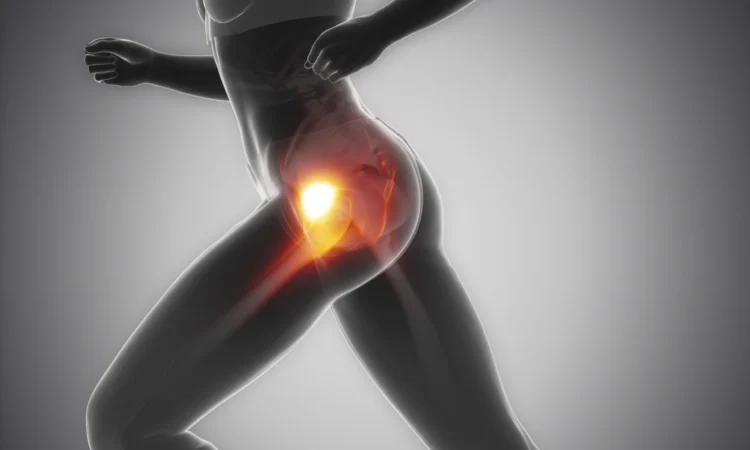
A pinched nerve in the hip can cause significant discomfort, affecting mobility and daily activities. This condition arises when the nerve in the hip is compressed or irritated by surrounding tissues, such as muscles, tendons, or bones. The pain often radiates from the hip down to the leg, and in some cases, it can extend to the lower back or even the foot. Whether you’ve experienced a pinched nerve in the hip due to a sudden injury or as part of long-term wear and tear, managing and preventing further discomfort is key to recovery.
Causes of a Pinched Nerve in the Hip
The causes of a pinched nerve in the hip can vary, but they are often related to certain factors, such as:
- Herniated Discs: A herniated disc in the lower back can place pressure on the nerves that travel down to the hip.
- Bone Spurs: Over time, the spine can develop bone spurs that pinch the nerves near the hip.
- Muscle Strain: Tight or inflamed muscles around the hip can contribute to nerve compression.
- Arthritis: Degenerative conditions such as osteoarthritis can narrow the space where the nerve passes, leading to compression.
Symptoms of a Pinched Nerve in the Hip
The common signs of a pinched nerve in the hip include:
- Sharp or Burning Pain: Often felt in the hip, buttocks, or thigh.
- Numbness or Tingling: In the hip, leg, or foot.
- Weakness: Affected legs may feel weak or fatigued when walking or standing.
- Radiating Pain: Pain that extends down to the lower back or leg, which may worsen with certain movements.
Managing and Treating a Pinched Nerve in the Hip
When dealing with a pinched nerve in the hip, early intervention and treatment are essential to alleviate symptoms and prevent further damage.
- Rest and Activity Modification: Avoiding activities that exacerbate the pain, such as prolonged standing, sitting, or heavy lifting, can reduce irritation to the nerve. Modifying daily activities to minimize strain is crucial.
- Physical Therapy: Targeted physical therapy exercises can help relieve pressure on the nerve and improve flexibility, strength, and posture. Stretching exercises to relieve tight hip muscles and strengthen the lower back can provide significant relief.
- Medications: Over-the-counter pain relievers like NSAIDs can help reduce inflammation and pain. In some cases, a doctor may prescribe stronger medications or steroid injections to manage severe pain.
- Stem Cell Treatment for Hip Pain: For chronic cases of pinched nerves or those caused by degenerative conditions like arthritis, stem cell treatment for hip pain has emerged as a promising solution. This therapy uses the body’s own regenerative cells to repair damaged tissues, reduce inflammation, and promote healing, offering a non-surgical option for patients looking to avoid invasive procedures.
Preventing a Pinched Nerve in the Hip
To prevent a pinched nerve in the hip, certain lifestyle modifications can be beneficial:
- Maintain a Healthy Weight: Excess weight places extra pressure on the hips and spine, contributing to nerve compression.
- Exercise Regularly: Strengthening exercises for the hips and lower back can improve flexibility and stability, reducing the risk of nerve impingement.
- Proper Posture: Avoid slouching or poor posture that places unnecessary strain on the spine and hip area.
- Stretching: Regularly stretching your hip muscles and lower back can keep the tissues around the nerve from becoming too tight or inflamed.
Conclusion
A pinched nerve in the hip can significantly impact your daily life, but with early intervention and proper treatment, relief is possible. By understanding the causes, symptoms, and effective management strategies, you can take proactive steps toward recovery. While traditional treatments like rest, physical therapy, and medication can provide relief, advanced therapies such as stem cell treatment for hip pain offer a promising alternative for chronic or severe cases.
Prevention is equally important; maintaining a healthy weight, practicing good posture, and incorporating regular exercise into your routine can help reduce the risk of developing a pinched nerve in the hip. By adopting a comprehensive approach that includes both treatment and prevention, individuals can better manage their symptoms, improve mobility, and enhance their quality of life.
If you are experiencing a pinched nerve in the hip or other hip-related concerns, consult with a healthcare professional to explore your treatment options. Whether through traditional methods or advanced regenerative treatments for orthopedic conditions, taking the right steps early can help ensure a smoother recovery and improved long-term outcomes.




